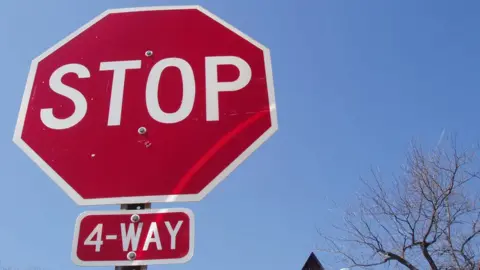Tesla recalls cars that may roll past stop signs
 Getty Images
Getty ImagesTesla is recalling nearly 54,000 vehicles because a software feature lets them roll through stop signs.
The company will issue an over-the-air software update that disables the Full Self-Driving Beta (FSDB) "rolling stop" function.
Elon Musk, the firm's chief executive tweeted that there were no safety issues and the cars just slowed down.
All-way stop signs, common on North American roads, require drivers to halt completely, before proceeding.
According to the National Highway Traffic Safety Administration (NHTSA): "Failing to stop at a stop sign can increase the risk of a crash."
In recall documents, the electric vehicle maker notes that if certain conditions are met, the "rolling stop" feature is designed to allow the vehicle to travel through all-way-stop intersections at up to 5.6mph without coming to a complete stop.
Tesla says the conditions include:
- the functionality must be enabled in FSDB settings.
- the vehicle must be travelling below 5.6mph
- no relevant moving cars, pedestrians or cyclists are detected near the intersection
- all roads entering the intersection have a speed limit of 30 mph
In January, Tesla met with NHTSA to discuss the rolling-stop feature, and shortly afterwards decided on a voluntary recall.
It covers some 2016-2022 Model S and Model X, 2017-2022 Model 3, and 2020-2022 Model Y vehicles.
'No issues'
Tesla says it is not aware of any collisions, injuries or fatalities related to the feature.
Mr Musk tweeted: "There were no safety issues. The car simply slowed to -2mph and continued forward if clear view with no cars or pedestrians."
The news follows the announcement in December of a recall of 475,000 Tesla vehicles in the US for potential issues involving rear-view cameras and the boot.
And in August the NHTSA opened an official investigation into Tesla's "self-driving" Autopilot system.
The safety administration said it was acting, following 11 Tesla crashes since 2018 involving emergency vehicles.
